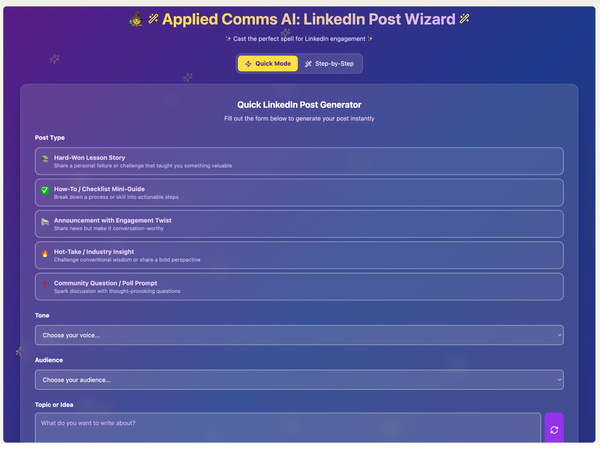How We Build: App Development Ground Rules
When we build AI tools for communications, we're not trying to create the next unicorn startup. We're solving real problems that comms professionals face every day.

When we build AI tools for communications, we're not trying to create the next unicorn startup. We're solving real problems that comms professionals face every day.
Our Building Philosophy
Every app we create starts with a genuine pain point. Whether it's drafting briefing documents, checking tone consistency, or generating media lists, we only build what we'd actually use ourselves.
We use simple, accessible tools – the sort of thing that you can use with minimal or no coding knowledge. This isn't about showcasing technical prowess; it's about demonstrating concepts quickly and transparently. If something takes more than a weekend to prototype, we're probably overcomplicating it.
We're also looking to be handy with our budget: where possible, we'll use cheaper – and ideally free – tools and platforms, also to make it something which is more accessible to replicate, remix, and be inspired by.
Staying Independent
We don't take money from tool providers or platforms. When we use OpenAI's API, Anthropic's Claude, or any other service, we pay standard rates like everyone else. No special access, no affiliate kickbacks.
Any code we develop is available upon request; just get in touch. You can see exactly how we built something, fork it, improve it, or ignore it entirely. We're not trying to create dependencies: we're sharing what works.
What You Can Expect
Honest failure reports alongside the successes. When an experiment flops (and we're sure many will), we'll tell you why. Even when something works brilliantly, we'll endeavour to explain the limitations we discovered.
Real usage metrics. How long did it take to build? How much did it cost to run? What wasted hours of our time? We'll share the unglamorous details.
No overselling. These are experiments and prototypes, not production-ready solutions. We'll always flag when something is rough around the edges or suitable only for specific use cases.
The goal isn't to replace human expertise, it's to augment it. See our ethics policy for more on our stance around this. Every tool we build assumes you know your job – and just need a better way to do parts of it.




